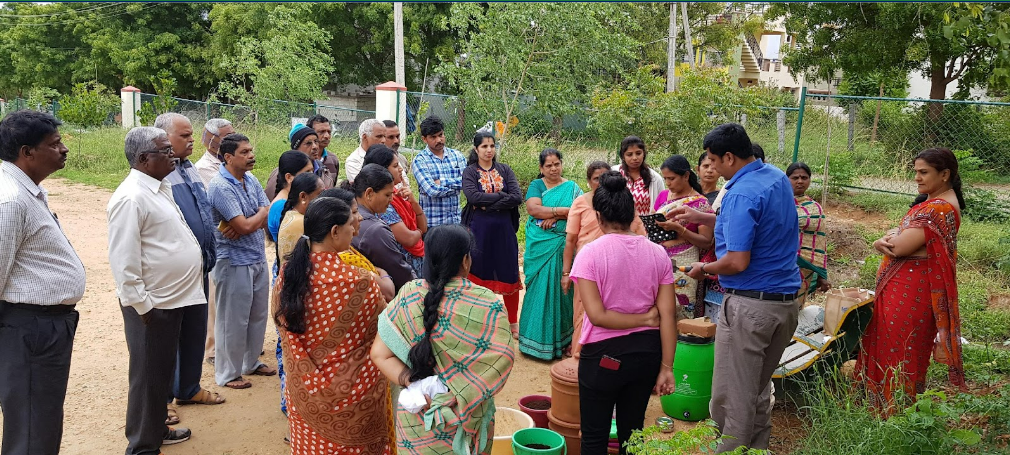Contributed by Rohini Malur, Kumuda C.S. and Anil Kumar
Zero Waste as a Pathway to Methane Mitigation
Environmentally sustainable waste work is useless without the integration of the informal sector and the opening of opportunities for the marginalized communities who bear the brunt of climate change.
For Hasiru Dala, this broadly means that we work with waste pickers, the people who “make a living collecting, sorting, recycling, and selling materials that someone else has thrown away” outside of a formal and recognized economy. In rural areas, this means working with waste pickers or with self-organized groups comprising women (who historically provide most of the informal and undocumented labor, and then are shunted out of formalization efforts when men are given more access to entrepreneurial roles).
Hasiru Dala works with local governments to issue occupational identity cards to waste pickers and also ways for them to be included in government schemes and benefits, as well as access to other public services. Our efforts to achieve environmental and social justice include multiple zero waste implementations across Mysore, Bengaluru and other smaller cities.
In Mysore, the waste collected from six wards of Zone 8 is brought to our zero waste management plant, comprising 3.5 MT of food/organic waste and 0.5 tonnes of dry/inorganic waste. Largely, the highly valuable dry waste is sold to nearby scrap dealers by the waste collectors. We compost the wet waste to create high-nutrition compost using windrows as a cost- and space-effective methodology, and sell to nearby farms at INR 2/- per kilogram.
Composting food waste from homes is a significant mitigator for methane and other greenhouse gases from landfills, since food waste contributes about 39% of methane emissions from landfills.

Windrow composting in Kesari Zero Waste Plant, Mysore
The plant is also functioning as a learning center for visitors, members of gram panchayats (village councils), and sanitary workers to replicate the same in their respective villages.
We have been running awareness campaigns across Mysore to show residents how to compost at home!

Learning sessions on composting in Mysore, Bangalore, India by Hasiru Dala
While we work in six wards (one zone) in Mysore city, in the nearby Nagawala Gram Panchayat we work across the entire area. Waste management is in a nascent stage with initial beginnings at segregated waste collection and management, but we noticed an impactful response to our awareness sessions on sustainable menstrual hygiene. Over 90% of the menstruating persons converted to use the cloth pads and menstrual cups we distributed during our sessions.
In Bengaluru, zero waste management efforts in Ward 177 and in the City Armed Reserve at Adugodi prove that waste management is most efficient as a collaboration between residents, waste workers, and officials. Residents banded together to compost 25 kgs of organic waste in a communal lane composter. Local pourakarmikas (municipal officials) ensure that leaf litter from the streets is composted. The composting activities in this ward have been extended to composting between 30-40 kgs of flower waste from a nearby temple.
In Adugodi, police quarters with 1400 households generate nearly 1 ton of organic waste, which is processed at the biomethanation plant. The BioCNG is then diverted for cooking food for 80-85 dogs of the armed reserve police.
Hasiru Dala has also been running a solid waste management facility in SDM, Dharwad. We have been able to get segregation of waste done at source through a series of awareness activities and we have been efficiently handling the recycling and disposal of dry waste. The wet waste generated had too much oil and was not compostable. Hence, this is being reused by diverting it to a piggery where this waste is being fed to pigs. Installing a biogas plant here is in the planning stage.
What we find as we work in urban and rural areas is that waste management in general but organic waste management as well is a collaborative process. It requires the active participation of government operations, residents and citizens, and the waste pickers in collection, segregation, and processing.
This would require local governments to have standards and budgeting for waste management, for an in-depth effort to recruit, train and upskill the informal labor and for residents to segregate waste at home. As we have shown in Mysore Zone 8 and Nagawala, this work is easiest to do in decentralized, local efforts, resulting in clean surroundings, a well-served workforce, and a circular economy even in food and agriculture.
—————————
Works Cited
Levine, J., and Daisy Chung. “The other greenhouse gas.” Reuters, 5 August 2023, https://www.reuters.com/graphics/FOOD-WASTE/METHANE/gdpzwqwqovw/. Accessed 9 November 2023.
“Waste Pickers.” WIEGO, https://www.wiego.org/waste-pickers. Accessed 9 November 2023.




























